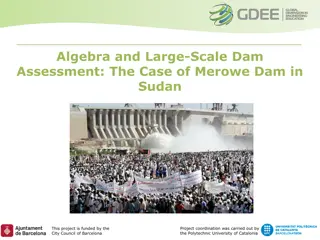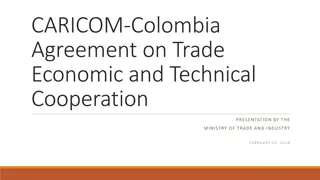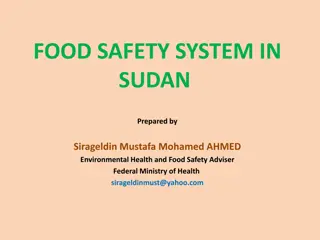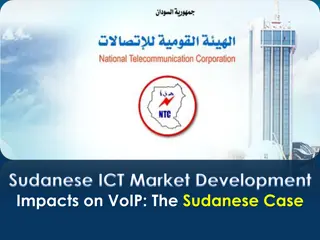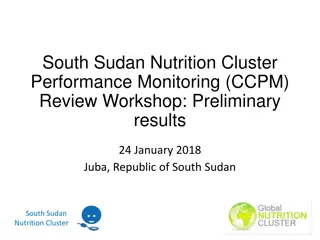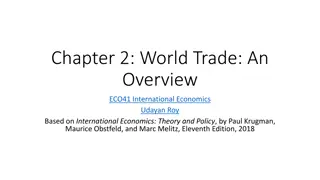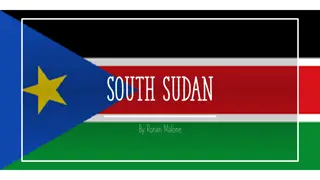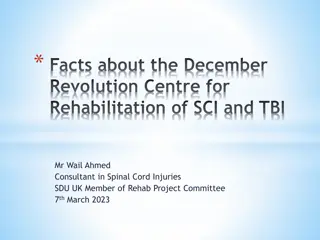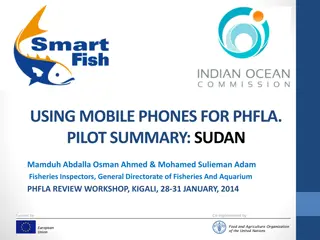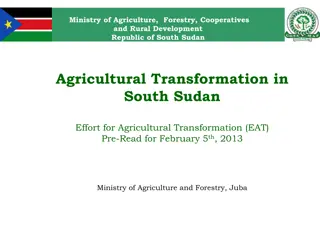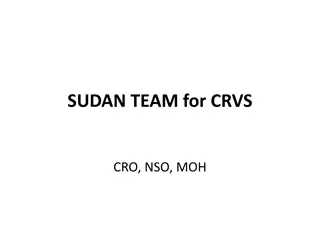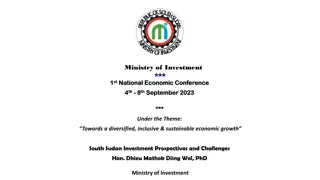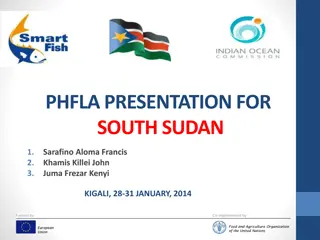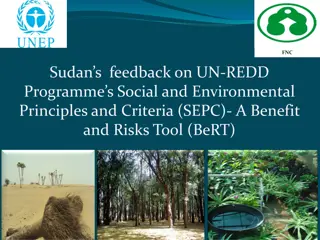South Sudan Ministry of Trade and Industry Overview
The Ministry of Trade and Industry in South Sudan plays a crucial role in shaping policies for trade and industry development, aiming for a diversified, inclusive, and sustainable economic growth. With a focus on professionalism, accountability, commitment, efficiency, teamwork, collaboration, and innovation, the Ministry works towards building a dynamic and competitive industrial sector integrated into global economies. Key functions include policy formulation, capacity building, enhancing entrepreneurial skills, ensuring ethical trade practices, and promoting standards for local and global markets.
Download Presentation

Please find below an Image/Link to download the presentation.
The content on the website is provided AS IS for your information and personal use only. It may not be sold, licensed, or shared on other websites without obtaining consent from the author.If you encounter any issues during the download, it is possible that the publisher has removed the file from their server.
You are allowed to download the files provided on this website for personal or commercial use, subject to the condition that they are used lawfully. All files are the property of their respective owners.
The content on the website is provided AS IS for your information and personal use only. It may not be sold, licensed, or shared on other websites without obtaining consent from the author.
E N D
Presentation Transcript
1stNATIONAL ECONOMIC CONFRERRENCE THEME: TOWARDDS A DIVERSIFIED, INCLUSIVE AND SUSTAINABLE ECONOMIC GROWTH PRESENTATION Hon. Kuol Athian Mawien, Minister Hon. Mary Akech Milla Taban, Undersecretary
1stNATIONAL ECONOMIC CONFERENCE THROUGH: Diversified and Inclusive Trade, Industrialization and Private Sector Competitiveness Presenter Mr. Thomas Serafino Ohure Director for Policy Advocacy and programs Venue Freedom Hall, 4th 8thSeptember 2023
INTRODUCTION The Ministry of Trade and Industry is a lead trade and industry advisory agency of the government and private sector development, responsible for formulation and implementation of policies that promote growth and development of domestic and foreign trade and industry. MANDATE The Ministry s mandate is derived from the Transitional Constitution of the Republic of South Sudan, Presidential Decree No. 101 of 2008 and No. 62 of 2010 and decree of formation of the Government of RSS in September 2011. The broader platform areas through which the mandate are: Vision Statement An industrialized South Sudan fully integrated into the world trade and global business sector. Mission Statement To foster internal and external trade and to systematically build an industrial sector that is dynamic, competitive and integrated into the domestic, regional and global economies .
INTRODUCTION To build sustainable and diversified economy that must contributes towards increased productivity, Goal wealth creation, and poverty reduction in South Sudan. Core Values; To complement its Vision and Mission and build its own culture, the Ministry s values are: 1. Professionalism - The existing skills in the Ministry will be harmonized for effective service delivery. We will continuously assess our training and capacity needs in order to create synergy and build a professional human resource base. 2. Accountability and Transparency transparent to the government and our clients and uphold high moral integrity in provision of services. - As a Ministry, we will endeavor to be accountable and 3. Commitment - We will be totally dedicated in all we do and embrace the culture of customer- oriented services. 4. Efficiency and responsiveness We will strive to conduct our function efficiently and serve our clients promptly in a fair manner. 5. Teamwork In all we do, we will cultivate team spirit, 6. Collaboration and consultation for effective service delivery 7. Innovativeness and creativity As a Ministry we shall be opened and proactive in seeking better ways of service delivery.
CORE FUNCTIONS Formulation and harmonization of policies, laws and guidelines related to trade and industry at all levels both domestic, regional and global markets. Develop programs and activities for institutional capacity building to meet the challenge of domestic, regional and global dynamic markets; Improve entrepreneurial skills, technological capabilities and accessibility to affordable and inclusive credits and markets. Ensure domestic trade is conducted in a smooth and orderly manner (fair, prudent and ethical trade); Facilitate the development of standards and quality system to meet production of goods and services requirements for local, regional and global markets; Facilitate and promote the development of non traditional exports products; Expand inter-state and cross-border trade with the Neighbouring countries;
CORE FUNCTIONS Advocate for removal of institutional and legal bottlenecks (NTBs, TBT); Facilitate PPP/PPD mechanisms. Regulate trade and industry, increase efficiency and effectiveness of ministry s human and financial resources; Advocates and implement the private sector development programmes; Drive and ensure South Sudan derived maximum benefits from regional and international trade relations; Strengthen trade relationships with all friendly countries on a Most Favoured Nations (MFN) bases; Champion diversification of markets and commodity export based by using comparative advantage; Foster value addition through promoting manufacturing of natural resources raw materials for value added goods for exports. Provide guidance to its parastatals (SSNBS, Competition and Consumer protection Authority, Export promotion board Etc.,) Promote all commercial sectors of the economy.
OVERVIEW OF TRADE PATTERNS South Sudan adopted a liberalize, open economy, private sector lead and free market systems; South Sudan is land and air-link country which posts a challenge of high cost transport; South Sudan s does not have a system for production of reliable and timely aggregated trade statistics; Import and export transactions currently recorded at the border are the only domestic source of trade data; South Sudan is crucially dependent on imports for the vast majority of consumption goods and services; In South Sudan, trade is dominated by imports of all goods and services, hence both (domestic and foreign) trade are distorted by unfair conduct of trade at all levels. Ongoing cross border trade characterize by smuggling
OVERVIEW OF TRADE AND INDUSTRY PARTNERS Cont Industrial development is an important precursor for eradication of poverty and unemployment in any developing country The are three types of industry; Primary industry - raw materials extraction Secondary industry - Manufacturing of goods Tertiary industry technical service sector of economy covering a range of services (Financial sector, schools, hotel and restaurants etc.,) Given this parameters, South Sudan meet the qualification of having industries though limited number and capacity with concentration within the city the capital city of Juba.
OVERVIEW OF PRIVATE SECTOR COMPETITIVENESS PATTERNS The Private Sector in South Sudan is organized in umbrella associations; Chamber of Commerce, Industry and Agriculture both at the National and State; Significant institutional capacity Significant entrepreneurial skills, disintegrated and aggregated into many smaller and independent sectors. Etablished South Sudan Microfinance Development Facility (SSMDF) could not sustain its operations due to funding constraints; South Sudan Business Forum (SSBF) scaled down activities due to funding constraints
ACHIEVED MILESTONES Policy Development Trade policy developed, reviewed and validated - in a draft; Industrial policy developed, reviewed and validated - in a draft Public, Private Partnership policy developed, reviewed and validated - in a draft; Private Sector Development Strategy developed to be reviewed; Regulations issued Import and Export regulations 2023 Small and medium Company Regulations 2021 Mobile Money and Banking Regulations Drafts Bills Over 22 commercial laws are enacted; Microfinance Bill Micro, small and medium enterprise (MSMEs) Bill Counterfeit Bill Competition and Consumer Protection Bill Physical market infrastructure Bill
ACHIEVED MILESTONES Cont.. Public, Private Partnership Bill develop is approval process is ongoing Ongoing Programs and Plans Profiled all existing national industrial projects with no visibility studies and environmental assessments done except two projects; Full engagement in regional trade agreements (EAC, TFTA, AfCFTA and WTO) and other regional economic protocols Established SSMFS an Apex national microfinance institutions; Established (SSBF) public-private dialogue mechanism with full functioning secretariat and a board; Designed a National Export and Investment Strategy (NEIS) 2023 - 2027
BOTTLENECKS TO EFFICIENT AND EFFECTIVE TRADE Enactment of policies, laws, regulations and guidelines to address distorted trade; Money as a commodity is a factor to trade distortions(inflation accelerates, commodity prices rises to match the increase resulting to decrease in buyers purchasing power; Interest rates on borrowings-Commercial Banks 24%-28%, Private Sector to Private Sector 100% Insignificant accessibility to markets both domestic and foreign; Non domestication of regional and international trade agreements; NTBS and BTBs complications in the market; Access to finance for small, micro and medium enterprises; Non existing commercial disputes mechanisms; Private sector competitiveness both domestic and regional markets;
MAINSTREAMING TRADE AND INVESTMENT In the absence of adopted trade policy, mainstreaming of trade and investment strategies in the national development plans remains a government (MoTI) priority. Developed of a clear, user-friendly, and implementable trade and investment strategies that responds to the development goals can play a significant complementary role of integration in the regional and global economic communities (EAC, TFTA, AfCFTA and WTO). Designed a National Export and Investment Strategy (NEIS) to enable the country to focus on concrete steps to strengthen its domestic market and increase diversification of exports (and markets) as a powerful engine for economic sustainable development. NEIS is to subsidize the growth of national productive capacities, make it less dependent on oil revenues and imports, improve its business environment. The NEIS goal is drawing on the country s viable endowments, benefits, strengths, and talents to towards a sustainable and inclusive economic growth for stability and lasting peace.
The National Exports and Investment Strategy VISION A sustainable, productive and diversified economy for inclusive development and prosperity in South Sudan
NEIS - Strategic Objectives Promote an enabling policy and regulatory environment for private sector-led growth and productive investment; the strategy supports the identification and development of new and appropriate financial instruments for SMEs to improve access to finance and provision of institutional mechanisms. 1. Strengthen South Sudan s productive capacities and reduce the country s dependence on imports; the strategy support continued investment in physical, human, and natural resources to stimulate opportunities for a rapid growth of the productive sector and ensure inclusive and equitable benefits in all the 10 states and the 3 administrative areas. 2. Support institutional capacity building and coordination to pursue South Sudan trade and investment development agenda and regional, international integration; the strategy ensure institutions are adequately equipped to mechanisms for economic recovery, facilitate integration. 3. address capacity trade and regional coordination economic and Support MSMEs development and competitiveness through accessible, affordable, and inclusive access to finance and capacity building; the strategy foster youth and women participation in economic activities for improve access to finance for a sustainable and inclusive growth; 4.
The Social Development Dimension o Employment: This allows to determine the impact of intervention in a sector by looking at the number of workforces in it. It also helps in assessing the impact of intervention on job creation. o Gender: This not only looks at the present involvement of women in the sector, but also assesses the potential to include women in high value-added activities of the sector thereby improving their skills, wages, and overall conditions. o Youth: This assesses the attractiveness of the sector for youth by looking at the potential of youth employment. o Ex-combatants and People Living with Disabilities. The South Sudan Development Plan calls for the effective and affordable disarmament, demobilisation and reintegration (DDR) of ex combatants and support to people living with disabilities.
Selected Sectors for NEIS Action Points Key Sectors for National Export and Investment Strategy Hides and Skins (incl. a livestock component) 1. Oilseeds 2. Natural Gum Arabic 3. Natural Honey 4. Tourism 5. Fruits and Vegetables (Job Creation and Youth Capacity Building Project) 6. Key Trade Support Functions for National Export and Investment Strategy Transport, logistics and trade facilitation 1. Skills development (incl. TVET and SME management) 2. Trade information & trade promotion Investment promotion 3. 4.
The Estimated Cost of NEIS Implementation No Strategy Estimated Cost 117,640,000 26,850,000 13,577,000 40,840,000 46,686,000 15,696,000 30,707,500 45,912,000 29,702,000 37,682,000 USD 405,292,500 1 Plan of Action National Export and Investment Strategy 2 Plan of Action Skills Development 3 Plan of Action Trade Information and Promotion 4 Plan of Action Investment Promotion 5 Plan of Action Transport and Trade Facilitation 6 Plan of Action Natural Honey 7 Plan of Action Gum Arabic 8 Plan of Action Hides and Skins 9 Plan of Action - Oilseeds 10 Plan of Action Wildlife Tourism Total
Thank You 19
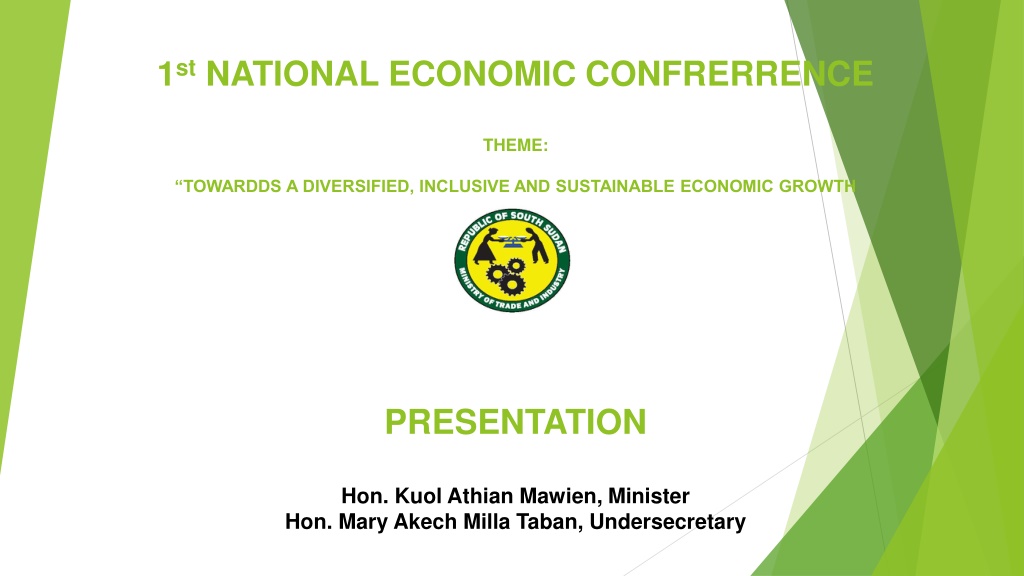
 undefined
undefined






